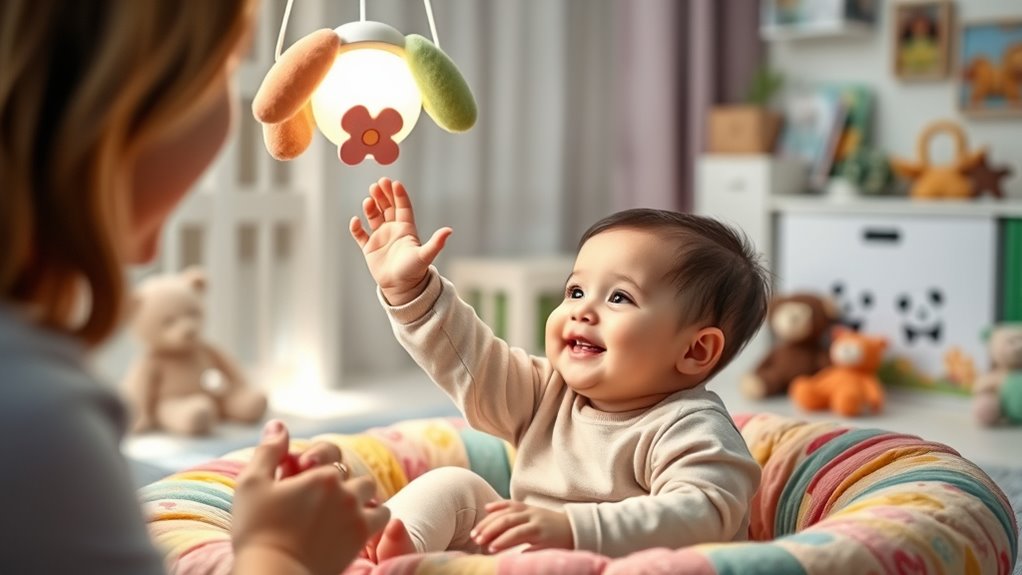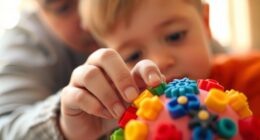In the first three months, your baby rapidly gains strength, showing improved head control and grasping reflexes that turn more intentional. Their senses sharpen as they focus better and differentiate colors and patterns, responding to sounds and sights. Socially, they begin making eye contact and smiling, while their sleep may be short and frequent but gradually pattern out. Feeding routines support growth, and ongoing development hints at exciting milestones ahead—exploring all these changes further will help you support their growth.
Key Takeaways
- During 0–3 months, babies rapidly develop motor skills like head lifting and grasping reflexes.
- Visual focus improves, enabling tracking of objects and recognition of faces and colors.
- Social awareness emerges with eye contact, smiling, and response to voices.
- Sleep totals 14–17 hours daily with frequent, short periods, gradually lengthening over time.
- Sensory development benefits from high-contrast toys, gentle stimuli, and multisensory experiences.
Physical Growth and Motor Skills

During the first three months, your baby undergoes rapid physical growth and begins developing basic motor skills. Tummy time becomes essential, helping strengthen neck and shoulder muscles and encouraging your baby to lift their head. You’ll notice they start to push up during these sessions, which is a sign of progress. The grasping reflex is strong initially; your baby will instinctively hold onto your finger or an object placed in their hand. Over time, this reflex evolves into intentional grasping, allowing them to hold small toys or your fingers. These early movements set the foundation for future milestones like rolling over or reaching for objects. Additionally, engaging in early motor skill activities promotes muscle development and coordination. Incorporating sensory toys can further enhance tactile exploration and aid in emotional regulation. Consistent tummy time and gentle encouragement support your baby’s physical development during these vital months. Regular practice of motor skill exercises can accelerate their progress and build confidence in their abilities.
Sensory and Perceptual Development

In the first three months, your baby’s senses rapidly develop as they become more aware of their surroundings. You’ll notice they start to focus their eyes better, engaging in visual tracking of moving objects or faces. This is a key part of their sensory exploration, helping them understand spatial relationships and improve coordination. Their ability to differentiate between colors and patterns also improves, even if their vision remains blurry at first. Your baby may turn their head toward sounds or bright lights, showing increased perceptual awareness. These early experiences lay the foundation for deeper sensory development. Encourage this exploration by offering high-contrast toys and gentle stimuli, helping your baby strengthen their senses and develop perceptual skills essential for future learning. Additionally, understanding the importance of early developmental milestones can guide you to support your baby’s growth effectively. Recognizing the significance of sensory and perceptual development in this stage can further help you foster an enriching environment for your child’s growth. Incorporating multisensory experiences can also enhance their perceptual skills by stimulating multiple senses simultaneously.
Communication and Social Interaction

How does your baby begin to communicate and connect with those around them? At this stage, your baby starts making eye contact, which shows growing awareness and interest. They may smile in response to your face or voice, signaling early social skills. Stranger anxiety might appear as your baby becomes more cautious around unfamiliar people, seeking comfort from familiar faces. Additionally, the use of natural language processing in technology can support early communication by providing responsive cues, although this is still evolving in parenting tools. Understanding developmental milestones can help parents recognize appropriate social behaviors at each stage. Recognizing the importance of tax implications can also be beneficial if parents are considering saving for their child’s future education through specialized accounts.
Sleeping Patterns and Feeding Habits

Newborns sleep in short, frequent periods, often totaling 14 to 17 hours a day, including daytime naps and nighttime sleep. During this time, your baby’s dreaming patterns are minimal but become more defined as they grow. Feeding routines are essential now; expect frequent feedings to satisfy their small stomachs and support growth. As their sleep and feeding habits develop, you may notice changes in how long they sleep consecutively and how often they wake. Monitoring sleep cycles can help you better understand your baby’s sleep patterns and adapt routines accordingly. Incorporating music therapy into your baby’s daily routine can promote relaxation and help establish calming bedtime rituals. Emphasizing a digital-friendly environment at home by limiting screen exposure can also positively influence your baby’s sleep quality.
- Establish consistent feeding routines to promote better sleep.
- Watch for signs of dreaming patterns, like twitches or smirks during sleep.
- Adjust sleep schedules as your baby matures, encouraging longer rest periods.
Frequently Asked Questions
How Can I Encourage My Baby’s Cognitive Development Effectively?
You can encourage your baby’s cognitive development by engaging in sensory play and increasing language exposure. Offer toys with different textures, sounds, and visuals to stimulate their senses. Talk to your baby regularly, describing what you’re doing and naming objects around you. Sing songs and read simple books together. These activities boost their understanding, language skills, and curiosity, creating a strong foundation for future learning.
What Are Common Signs of Developmental Delays at This Stage?
Have you noticed your baby isn’t reaching milestones like babbling, smiling, or sitting up? These signs might indicate developmental delays. It’s vital to schedule a developmental screening if you’re concerned. Early intervention can make a significant difference in your child’s progress. Trust your instincts and seek professional advice promptly; catching delays early helps make certain your baby gets the support they need to thrive.
How Do Teething and Illness Affect Developmental Milestones?
Teething discomfort and illness can temporarily slow down your baby’s progress in reaching milestones. During teething, your little one might be irritable, have trouble sleeping, or show reduced activity, which can delay motor skills or speech development. Illness impacts their energy levels and focus, potentially delaying milestones like sitting or crawling. Rest and proper care help them recover faster, ensuring they catch up on their developmental journey.
When Should I Worry About a Lack of Social Interaction?
If your baby shows almost no interest in social interaction after six months, it’s time to be concerned. When social interaction seems nonexistent or drastically delayed, it could signal developmental concerns. You should consult a healthcare professional if your child isn’t making eye contact, responding to their name, or engaging with others by 12 months. Early intervention can make a big difference in addressing social and developmental issues.
What Activities Promote Emotional Bonding in Infants?
You can promote emotional bonding in your infant through touch and cuddles, which help them feel secure and loved. Engage in responsive communication by making eye contact, talking softly, and responding to their cues promptly. These activities strengthen your connection, build trust, and support their emotional development. Consistent physical affection and attentive interactions create a safe environment where your baby feels valued and emotionally secure.
Conclusion
In these first few months, you’re watching your little one’s world bloom like a delicate flower. Every smile, grasp, and tiny sound marks a milestone on this incredible journey. Remember, you’re the steady anchor guiding their growth, turning moments into memories. Though these early days may feel like a whirlwind, they’re also the foundation for a lifetime of discovery. Embrace each step, knowing you’re nurturing a precious soul destined to shine.









